Birst vs Tableau
May 25, 2023 | Author: Michael Stromann
8
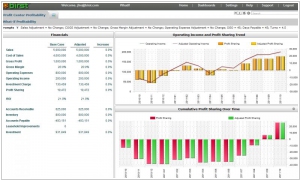
Infor Birst is the only Enterprise BI platform born in the cloud. Find out why more than a thousand businesses rely on Birst for Enterprise BI. Learn to think fast. Enterprise-caliber BI delivers accurate, actionable content in an intuitive, self-service business intelligence environment. It allows users to combine data from different source systems in a single BI platform to get answers to their most pressing business concerns in real time. And, when the questions change, it adapts quickly to the new request.
30

Tableau complements your natural ability to understand data visually. Our breakthrough products let you create rich analyses and share your insights with colleagues in seconds. Connect and visualize your data in minutes. Tableau is 10 to 100x faster than existing solutions. From spreadsheets to databases to Hadoop to cloud services, explore any data with Tableau.
Birst and Tableau are both powerful business intelligence (BI) platforms, but they differ in several key aspects:
1. Data Preparation and Integration: Birst offers a comprehensive end-to-end data preparation and integration process, enabling users to connect to various data sources, cleanse and transform data, and create a unified data model. Tableau, on the other hand, focuses more on data visualization and analysis, relying on data sources that have already been prepared. Birst provides more robust data integration capabilities for organizations with complex data environments.
2. Data Modeling and Governance: Birst is known for its semantic layer approach, which allows users to create and manage reusable data models and business definitions. This enables consistent and governed access to data across the organization. Tableau, while it offers some data modeling capabilities, is more flexible and suited for agile and self-service analytics, often relying on the data sources' existing structure and definitions.
3. Scalability and Enterprise Readiness: Birst is designed to scale for enterprise-level deployments, with features such as multi-tenancy, data federation, and distributed processing. It also offers advanced security and administration capabilities suitable for large organizations. Tableau is widely adopted in departments and smaller-scale deployments but may require additional configurations for enterprise-level scalability and governance.
4. Data Visualization and User Experience: Tableau is renowned for its intuitive and visually appealing data visualization capabilities. It provides a drag-and-drop interface that enables users to create interactive dashboards and explore data easily. Birst offers robust visualization capabilities as well, but it may require more configuration and customization to achieve similar levels of user-friendliness and visual appeal as Tableau.
5. Market Focus and Pricing: Birst targets a range of industries, including healthcare, manufacturing, and retail, with a focus on enterprise-grade analytics solutions. Tableau has a broader market presence and appeals to various industries and organizations of different sizes. In terms of pricing, Birst typically follows a subscription-based model, while Tableau offers both subscription and perpetual licensing options.
See also: Top 10 Business Intelligence software
1. Data Preparation and Integration: Birst offers a comprehensive end-to-end data preparation and integration process, enabling users to connect to various data sources, cleanse and transform data, and create a unified data model. Tableau, on the other hand, focuses more on data visualization and analysis, relying on data sources that have already been prepared. Birst provides more robust data integration capabilities for organizations with complex data environments.
2. Data Modeling and Governance: Birst is known for its semantic layer approach, which allows users to create and manage reusable data models and business definitions. This enables consistent and governed access to data across the organization. Tableau, while it offers some data modeling capabilities, is more flexible and suited for agile and self-service analytics, often relying on the data sources' existing structure and definitions.
3. Scalability and Enterprise Readiness: Birst is designed to scale for enterprise-level deployments, with features such as multi-tenancy, data federation, and distributed processing. It also offers advanced security and administration capabilities suitable for large organizations. Tableau is widely adopted in departments and smaller-scale deployments but may require additional configurations for enterprise-level scalability and governance.
4. Data Visualization and User Experience: Tableau is renowned for its intuitive and visually appealing data visualization capabilities. It provides a drag-and-drop interface that enables users to create interactive dashboards and explore data easily. Birst offers robust visualization capabilities as well, but it may require more configuration and customization to achieve similar levels of user-friendliness and visual appeal as Tableau.
5. Market Focus and Pricing: Birst targets a range of industries, including healthcare, manufacturing, and retail, with a focus on enterprise-grade analytics solutions. Tableau has a broader market presence and appeals to various industries and organizations of different sizes. In terms of pricing, Birst typically follows a subscription-based model, while Tableau offers both subscription and perpetual licensing options.
See also: Top 10 Business Intelligence software
Birst vs Tableau in our news:
2019. Salesforce acquires data visualization company Tableau for $15.7B
Salesforce has made a significant acquisition by purchasing Tableau in an all-stock deal worth $15.7 billion. This strategic move marks Salesforce's expansion beyond CRM software and into the realm of advanced analytics. While Salesforce had previously pursued the acquisition of LinkedIn (which was acquired by Microsoft), the Tableau deal enables Salesforce to enhance its customer engagement and data intelligence capabilities, similar to what LinkedIn could have offered. Additionally, this acquisition positions Salesforce to compete with Google's recent announcement of acquiring Looker, further reinforcing its market presence.
2018. Tableau acquired AI-analytics startup Empirical Systems
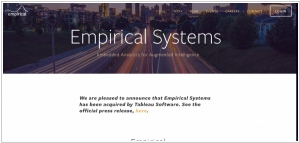
Enterprise BI giant Tableau has made an acquisition of Empirical Systems, a startup in its early stages that specializes in AI. The product offered by Empirical Systems is currently in private Beta and functions as an embedded engine within other applications. This feature seamlessly integrates with the Tableau analytics platform, making it a valuable addition. In addition, Tableau will be able to leverage the expertise of the engineering team from Empirical Systems to enhance its AI capabilities and utilize the advanced technology that underlies the startup's product. Empirical Systems was specifically developed to simplify complex data modeling and enable sophisticated statistical analysis, thereby empowering individuals to gain insights from their data and make informed, data-driven decisions, regardless of their technical proficiency.
2018. Tableau gets a new data preparation tool
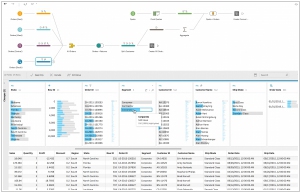
Data analytics platform Tableau has introduced a new data preparation tool. The primary objective is to provide users with a visual means to shape and cleanse their data, which is particularly crucial as businesses increasingly gather data from diverse sources. While Tableau Prep offers automation capabilities, its most significant feature is the visual interface it affords users to create such workflows. Prep supports all standard Tableau data connectors and enables users to perform calculations as well. Additionally, the company has introduced a server plan for businesses seeking on-premises or cloud-based deployment, along with a fully hosted online plan. Pricing for these options ranges from $35 to $70 per user per month.
2017. Tableau reveals Linux version
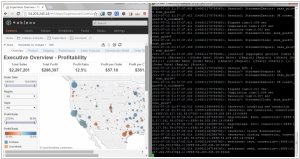
Business Intelligence software provider Tableau has recently unveiled Tableau Server on Linux, offering users an alternative option to run the software without relying on Windows Server. Additionally, Tableau has made a strategic acquisition of HyPer, a startup known for creating Hyper, a high-performance, main memory database. This acquisition aims to enhance Tableau's capabilities in terms of performance, faster loading times, and scalability. Hyper replaces Tableau's TDE database and is an integral part of Tableau 10.5, which is currently available in beta. Moreover, Tableau has taken a step further by opening its API, inviting users to seamlessly integrate and collaborate with third-party applications directly within the Tableau platform.
2017. Tableau acquired natural language processing startup ClearGraph
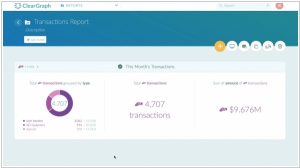
Business intelligence solution provider Tableau has acquired ClearGraph, a service that enables users to query and visualize large volumes of business data using natural language queries. Tableau intends to integrate this technology into its own products, aiming to simplify the process of data visualization for its users through similar queries. Recent advancements in natural language processing and machine learning have enabled ClearGraph and similar services to gain a deeper understanding of the underlying database, effectively translating sentences into database queries. Considering that competitors like Microsoft's Power BI already offer this capability, it comes as no surprise that Tableau is exploring this avenue as well.
2016. Tableau to launch visual data-prep software with deep learning
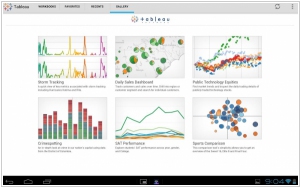
Tableau is expanding its offerings by venturing into the data-wrangling domain and has announced its plans for a visual data-preparation software known as Project Maestro. The objective is to provide users with a similar "self-service" approach to data cleaning and preparation as they have already established for data analysis. In addition, the company intends to incorporate Natural Language Processing (NLP) to enable new methods of interacting with data using human language, such as voice and text. Furthermore, Tableau Machine Algorithms will be implemented to provide recommendations for workbooks and data sources that are trusted, widely utilized, and contextually relevant to individual workflows. The software is expected to be released "later next year."
2016. Tableau acquired German startup HyPer

BI giant Tableau has made an acquisition by purchasing HyPer, a German startup specializing in advanced database technology. Tableau's intention is to integrate this technology into its existing product lineup. Tableau, known for its expertise in business intelligence and analytics, leverages business data to help companies derive meaningful insights from it. The incorporation of HyPer's database technology is expected to enhance the performance of Tableau's products. By introducing HyPer's capabilities, Tableau aims to deliver accelerated data analysis, regardless of the data set's size. Additionally, the integration is intended to unify transactional and analysis systems, potentially speeding up relevant processes. Furthermore, the technology will provide richer analytics capabilities and support for structured or semi-structured data, which has become increasingly vital in processing extensive Big Data sets.
2015. Cloud business intelligence service Birst raises $65M
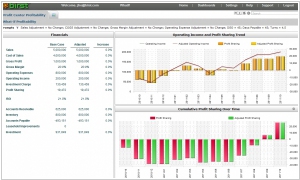
Birst, a cloud-based business intelligence (BI) platform, has secured an additional $65 million in funding. The primary challenge Birst aims to address is the growing volume of electronic information being collected by businesses, which, when analyzed intelligently, has the potential to drive better strategic decision-making. While companies like IBM and others have been offering business intelligence solutions for some time, the issue lies in the prevalence of on-premise legacy systems that struggle to handle newer forms of data and lack the ability to leverage advanced algorithms for data extraction. Additionally, there is a growing demand for direct access to this information from business users themselves, bypassing the need for extensive involvement from a dedicated data analytics team. Birst's cloud-based BI platform seeks to bridge these gaps by providing a modern and agile solution that empowers businesses to effectively harness their data for informed decision-making.
2014. Data Analytics service Tableau hits $100M per quarter revenue mark
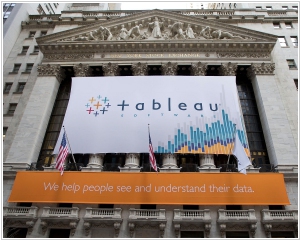
Data analysis and visualization company Tableau continues its impressive growth trajectory, achieving a significant milestone by surpassing $100 million in revenue during the third quarter. Tableau is widely recognized as a leading provider of advanced analytics software, attracting new customers at a rapid pace. Despite facing competition from startups and even Salesforce.com, eager to challenge its expanding market share, Tableau remains a trailblazer in the field of business intelligence and analytics. Other players in the market have observed Tableau's success in transforming data analysis into an accessible visual experience, even for non-analysts. Consequently, they are striving to develop products that are more comprehensive, faster, user-friendly, and cost-effective. However, Tableau still has ample room for further growth, supported by its robust financial resources. The company is heavily investing in research and development, including a dedicated R&D team. In September, Tableau provided a preview of its upcoming mobile product, known as Project Elastic, demonstrating its commitment to innovation.



